
Going Green
Bart Bettencourt has operated a wood shop in Williamsburg since 2001, but it wasn’t until 2003 that he began Scrapile with Carlos Salgado (who’s also known for his faux commitment-ceremony “exhibit” with Tobias Wong at Moss, when the furor over gay marriage was at its peak). Scrapile furniture, made entirely from cast-off wood scraps they collect from manufacturers like Steinway & Sons, proves that ecofriendly design can also be sleek and modern. Now the pair are trying to grow the project into “a repeatable system that can accept new pieces and expand into new materials,” says Bettencourt, who also makes furniture under his own name.
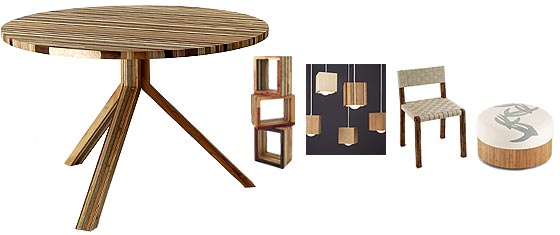
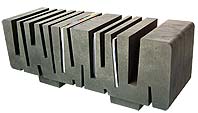
Ecologically Friendly
Matt Gagnon’s paper table (2005; $3,400 at the Future Perfect), with slots for magazines, is made from recycled paper.

Tobias Wong and Josée Lepage’s Waterrr prototype (2006) for the upcoming HauteGreen show creates a new designer water “brand” by recycling other bottles and filling them with fresh water.

“Soft” Recycling
Even work without green intent turns detritus into design. Klaus Rosburg’s Light Cloud (2005; $3,500 through Sonic Design; 718-387-7927) is made from gumball-machine prizes.
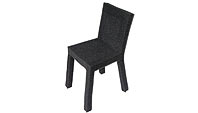
Jun Aizaki’s foam chair (which will be shown at Altoids Living Spaces 2006) stretches over a wooden frame.
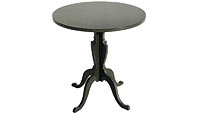
Remixing History
Design tradition is also raw material. Redstr’s Spinderalla (2005; $800 at the Future Perfect) was created from found online images of Empire side tables.

Richard Saja’s Historically Inaccurate Decorative Arts pillow (2003; $184 at the Future Perfect) adds cheeky hand- embroidering to dead-stock fabric.
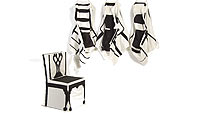
Meta-Design
Design history can also be used for satirical purposes. Portia Wells’s Slipcover Chair Project (2004; $7,500 at portiawells.com) treats classic Eames, Chippendale, and Shaker chairs as fashion pieces to be changed at will.
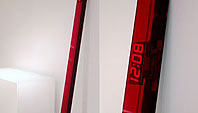
Tobias Wong’s Walter Wayle III (2001) appropriated the name of a discontinued Philippe Starck clock.
Next: Classic Craft